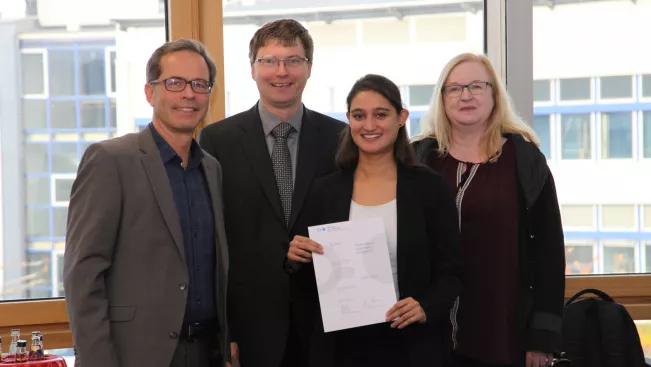Graduate Institute
Time for scientific freedom

Ms. Singh, why did you apply for a doctoral scholarship at the Graduate Institute of H-BRS in May 2017?
I needed a scholarship to sustain my livelihood and still be able to concentrate on my doctorate. Working in addition to the doctorate is, in my view, an important part of the doctoral student. However, if it gets too much, the promotion suffers. And this should always come first. I applied for three different scholarships: the grant from the Equal Opportunity Center, the scholarship from the Department of Economics and the Reiner Clement Doctoral Scholarship. It is a special honor that I was selected for the latter.
Did you know Prof. Clement personally?
Unfortunately no, but my colleagues have told me that until his death in 2017, Prof. Clement was very committed and personally appreciated by both colleagues and students. He was probably one of the best.
What progress have you made since the beginning of the scholarship?
I write a cumulative dissertation and have to write several contributions / papers that are published in scientific journals. I have started two new articles since last fall and hope to release them in 2018.
You have graduated from the University of Duisburg-Essen with your bachelor's and master's degrees and are now doing your PhD not only cumulatively, but also cooperatively. Your supervisor is Prof. Prinz at the University of Duisburg-Essen, your second supervisor Prof. Peters at the H-BRS. Why did you choose this path of graduation from a university?
My supervisor already had contacts to the H-BRS through his doctoral network. When the H-BRS also offered me a position as a research associate, I decided to do my doctorate cooperatively. I feel very well here and have not regretted this step.
Imagine talking to students who are about to graduate with a bachelor's degree. Would you advise them to also pursue a master's degree or even a doctorate?
Of course, having a bachelor's degree in the private sector makes it attractive to make money, especially in times of shortage of staff. But to my opinion education is a very good thing and thankfully, we enjoy free access to almost free education in Germany. So I wanted to use this privilege extensively. A postgraduate degree, be it the master's degree or a subsequent doctorate, does not only serve as a further education in terms of content, but above all as a means of personal development. I do not want to miss the experience I've gained so far with colleagues, professors and myself. Working as freely as in science is hard to find in the free economy. And my dad used to tell me, "You can work and earn a lot of money later on, now is the time to learn and be free." For many, the doctoral thesis is very far away and many have little idea of what that would be like. I can only recommend talking to the professors and exploring possibilities. Whether it works in the end or you decide differently, because it is not the right thing. It's about considering it and consciously choosing it or not. Then you will regret nothing later.
Where do you see yourself professionally and privately in ten years?
I ask myself this question again and again over the year - professionally, I can imagine a lot and will first look, where life leads me. It would be a possibility to become a professor because I especially enjoy the research. On the other hand, I could also imagine working in the human resources department or in an institute. Maybe this can also be combined well. To have several options would be optimal for me, because then I would have a basic income and still have time to try something new or at times more intense to look after family and my children who will hopefully already live in ten years.
Since readers are always so curious and attentive when it comes to personal issues - will you tell us where your name comes from?
My father was from India and the name means "The Dawn". Funny enough, the Roman goddess of the dawn, Aurora, is godmother for an international university network of my home university Duisburg-Essen.